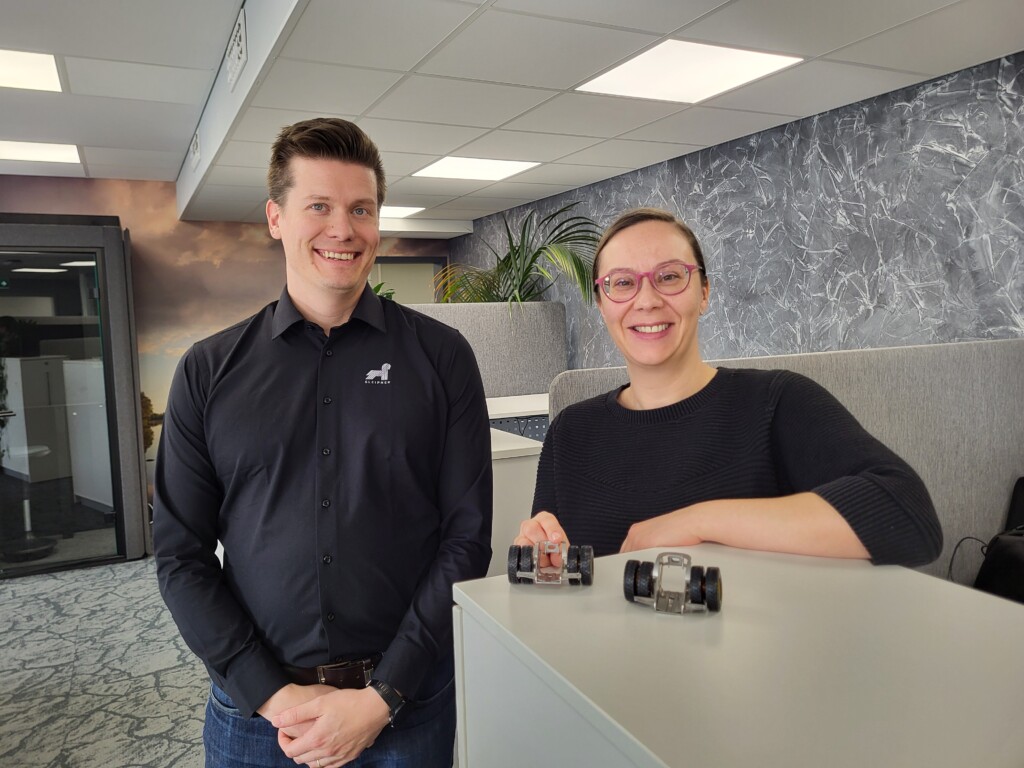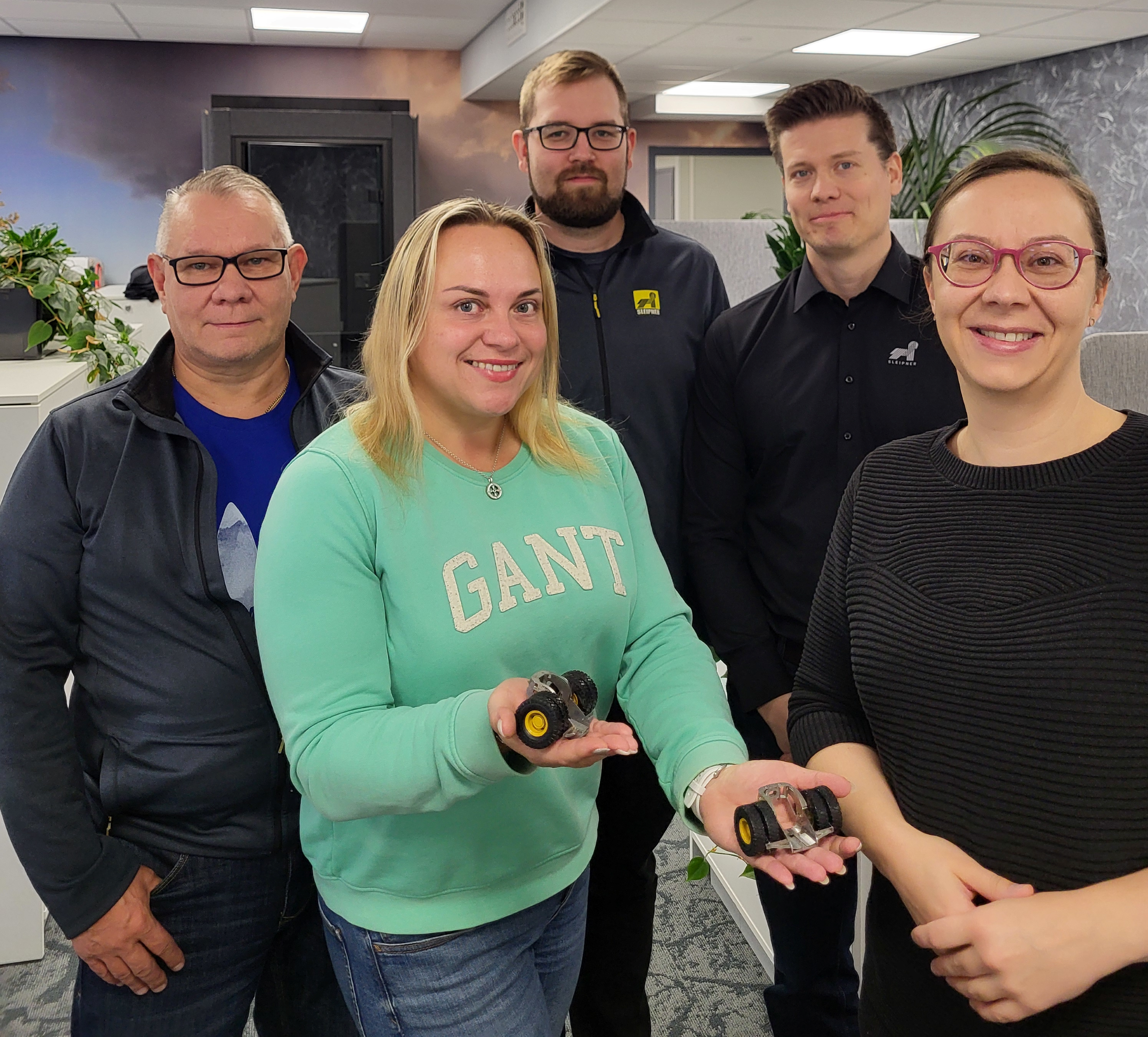Sleipner Finland Oy has been developing its ISO 9001 quality and ISO 14001 environmental management systems for the past year and was granted certificates for these in early autumn. The company has also invested in promoting the themes of quality and sustainability through its recruitment activities. Sleipner’s sustainability work is now led by Project Manager Outi Piisilä, who joined the company at the beginning of the summer. Piisilä has previous experience in civil engineering and logistics and earned a degree in environmental technology from Lappeenranta University of Technology.
“”I have been surprised by how rapidly the mining sector has progressed in terms of the digital transition. Of course, the capital in this industry is also massive,” says Piisilä.

Eero Niskanen, Supply Chain Specialist and Outi Piisilä, Project Manager
Dedicated to long-term sustainability work
Despite the recent certifications, Sleipner’s journey towards long-term and systematic sustainable development is in many respects only just beginning. Both quality and environmental management systems audited by a third party and allocating increasing resources for sustainability work are part of the company’s international growth strategy.
“I consider these quality and environmental systems to be tools for promoting sustainability. They are also the minimum level at which you can operate in the international market. This is why we chose the world’s most recognised management systems according to ISO standards, and also because they are widely applicable regardless of the industry and whether the organisation in question is public or private,” Piisilä explains.
Sleipner Finland’s compliance with the ISO 9001 quality and ISO 14001 environmental management systems is audited and certified by Bureau Veritas Certification, which is accredited by the national accreditation body FINAS.
In addition to the individual themes related to quality and environmental management, Sleipner is currently working on a comprehensive sustainability strategy. Although the EU’s Corporate Sustainability Reporting Directive (CSRD) does not yet place obligations on the company, Sleipner is part of the supply and value chain of its large customers.
“In order for our customers to report on their own ESG themes, they also have to ask us about these issues, so we want to prepare for this in time. While customer demands are certainly driving these developments forward for us, sustainability is also an extremely important intrinsic value for us, within the company itself and in management. It can even be seen in our corporate values in the word Respect. This was immediately apparent when beginning my HR work in one-on-one discussions, in which everyone commented that people here are treated as valuable resources, not just expenses for the company. We are a very supportive workplace on many levels,” Piisilä confirms.
According to Piisilä, in addition to its ongoing sustainability strategy work, Sleipner is currently conducting product-specific carbon footprint calculations, initially for a DB Series lowbed trailer and E Series dolly in collaboration with the engineering firm Etteplan.
“Our customers are primarily interested in the carbon footprint of the product they are buying and secondarily the carbon footprint of our company, which in turn is important to us. Initially, we are focusing on calculating the carbon footprint of our products, but we have noticed that it has been difficult for some of our suppliers to respond to related questions. Our quality and environmental work progresses according to customer needs, which also pushes us forward. For example, our existing code of conduct will also be extended further in our supply chain in the future,” says Piisilä.
The intention at Sleipner is that in the future, offers will always be accompanied by an attachment specifying the carbon footprint for each product.
Processes enhanced to meet the needs of customers and
Sleipner itself as a growth company
In addition to reviewing the company’s own operations, the quality and environmental management systems involve a supply chain audit, which at Sleipner was overseen by Eero Niskanen, Supply Chain Specialist, who is responsible for purchasing and developing supplier collaborations. Niskasen has long work experience in large global companies manufacturing agricultural and forestry machinery, including practical experience in the processes of a large company. Niskanen, who joined Sleipner a little over a year and a half ago, states that supplier audits are a clear step towards more professional purchasing activities and interactions with the supplier chain.
“We started at the beginning of this year and have already performed around a dozen audits. Maybe a couple more will be completed this year. Our supplier audits have been received very openly. We even heard comments from some customers that they had been waiting for us to perform them,” Niskanen smiles.
“We plan to conduct audits every year for our strategically important partners. It is not enough that our own operations are sustainable; it must be ensured throughout the supply chain. Not all have audited ISO 9001 or ISO 14001 systems, for example, in which case it is necessary to go through in more detail how sustainability is taken into account within these companies. As a rule, our suppliers have been able to respond to our questionnaire or have provided answers afterwards,” Niskanen describes.
According to Niskanen, auditing can be a good learning experience for both parties by highlighting observations and development proposals, as well as monitoring that they are properly addressed.
“Also in terms of risk management in our supply chain, it is important that supplier audits are carried out. These audits cover manufacturing technologies, machinery and equipment, preparedness for production interruptions and other disruptions, and the financial situation of companies. Sleipner has had supplier meetings before, of course, but now these are more systematic and address established operations,” Niskanen adds.
“The objective is that these activities would no longer depend so strongly on individual people and that the process would always be the same. Our former methods were beginning to become an obstacle to growth. In order for us to grow, everything must be clear and consistent, regardless of who is involved. Even such issues as when a product is finished two weeks ahead of time and the containers arrive too early can cause problems for the customer,” says Piisilä.
“Of course, there has been a lot to do in this development work, and others within our organisation have been doing it longer than I have. However, from my point of view, the work has progressed without major problems. Clear processes and clear responsibilities have reduced, for example, overlapping work. In a short time, a big step has been taken from being a so-called small company to a more mature and better one. The ISO certificates and supplier audits have also taken our supplier chain management, risk management and sustainability issues to the next level. The most important aspect is that Sleipner’s management is fully committed to change, so it is more likely that change will be achieved,” sums up Niskanen.
Additional information – outi.piisila@sleipner.com
